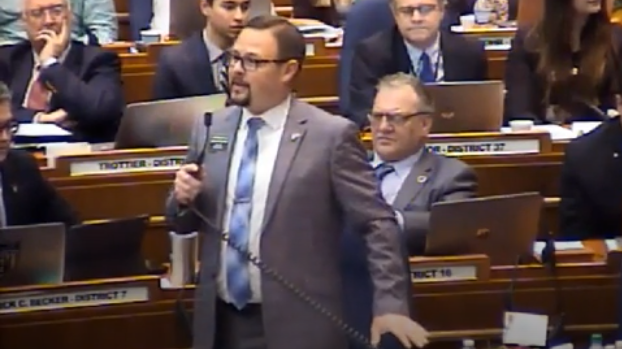Video: Lawmakers Rip Department of Transportation for “Ridiculous” $50 Million Fiscal Note on Speed Limit Bill

Yesterday the state House failed to pass HB1264 which would have North Dakota’s speed limit on multi-lane highways to 75 mph for state highways and 80 mph for the interstates.
I wrote “failed to pass” instead of “voted down” because the vote was actually a tie. It was 46 to 46, with 2 lawmakers not voting.
The bill may come to the floor again – they often do after close votes – but perhaps more interesting than the issue itself is the criticism some of the lawmakers had for the fiscal note attached to the bill by the Department of Transportation.
Fiscal notes, for those of you who might not follow this stuff close, are a report on the expected costs or revenues resulting from a particular piece of legislation. They’re usually put together by the state agency with oversight of the policy area the bill is dealing with. With speed limits, it’s the Department of Transportation.
Problem is, state agencies often use fiscal notes to try and manipulate policy outcomes. Instead of providing unbiased facts and analysis, the state agencies game these fiscal notes to achieve a particular political outcome. I’ve written about this phenomena before, and lawmakers have long made jokes about the “death by fiscal note” tactic, but I’m not sure I’ve ever seen as forceful a push back against manipulative fiscal notes as during yesterday’s floor debate on HB1264.
Here’s the video:
[fcc_jw_player key=”eLCcCe7r” /]
Rep. Ben Koppelman (R-West Fargo) ripped “ridiculous fiscal notes” during his floor testimony. He also suggested that the Department of Transportation had inflated the costs they included in their fiscal note. “In South Dakota, which has roughly the same number of Interstate miles as we do, they had a cost of $22,000 for 80 mph,” he said referring to that state raising its speed limit. “Our cost, $4.8 million.”
In the fiscal note attached to HB1264 (see below) the Department of Transportation estimated costs at $4.8 million in the next biennium and over $4.5 million per biennium afterward “for at least 20 years.” That’s nearly $50 million. Which seems a bit excessive for a relatively modest change to the speed limit, don’t you think?
“Apparently in North Dakota we pay six times than our neighbors do to replace a sign,” Koppelman added, referring to the DOT’s estimated costs for changing signage along the roads. He joked that North Dakota should “bid South Dakota and Montana to be our sub-contractors” to install new signs since they do it cheaper.
Rep. Rick Becker (R-Bismarck) was critical of the fiscal notes executive branch agencies produce in general. “These fiscal notes are causing some consternation among the lawmakers,” he told the House floor. He added that “fiscal notes are used as lobbying.”
“Sometimes signs cost a lot, sometimes they don’t,” he said.
“We citizen, part-time legislators need to rely on full time agency employees,” he continued. He said he’d like to see “a little more accuracy…so we don’t feel like we’re being bamboozled.”
As I’ve noted before, it’s not just the Department of Transportation which plays political games with fiscal notes.
[scribd id=399655690 key=key-lQP7e26rEXl5nu6xlCMy mode=scroll]




